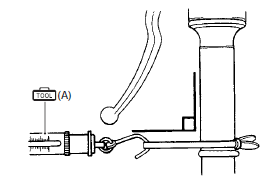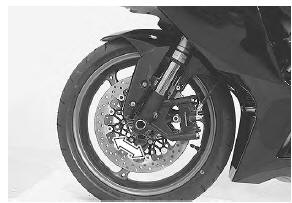Suzuki GSX-R 1000 Service Manual: Steering tension adjustment
Check the steering movement in the following procedures:
- by supporting the motorcycle with a jack, lift the front wheel unit is off the floor 20 – 30 mm (0.8 – 1.2 In).
- Remove the steering damper. Refer to “steering damper construction” .
- Check to make sure that the cables and wire harnesses are properly routed.
- With the front wheel in the straight ahead state, hitch the spring scale (special tool) on one handlebar grip end as shown in the figure and read the graduation when the handlebar starts moving.
Initial force 200 – 500 grams
Special tool

(a):
09940–92720 (spring scale)

- Do the same on the other grip end.
- If the initial force read on the scale when the handlebar starts turning is either too heavy or too light, adjust it till it satisfies the specification.
- first, loosen the front fork upper clamp bolts, handlebar clamp bolts, steering stem head nut and steering stem lock-nut, and then adjust the steering stem nut by loosening or tightening it.
- tighten the steering stem lock-nut, stem head nut, handlebar clamp bolts and front fork upper clamp bolts to the specified torque and re-check the initial force with the spring scale according to the previously described procedure.
- if the initial force is found within the specified range, adjustment has been completed.
| Note hold the front fork legs, move them back and forth and make sure that the steering is not loose. |

 Steering stem bearing removal and installation
Steering stem bearing removal and installation
Removal
Remove the steering stem upper bearing and steering stem lower bracket.
Refer to “steering / steering damper removal and installation” .
Remove the steering stem lower bearing i ...
 Specifications
Specifications
Tightening torque specifications
Note
the specified tightening torque is described in the following.
“Handlebar components” “steering components” “steering
damper c ...
Other materials:
Exhaust system components
Exhaust pipe gasket
Exhaust pipe assembly
Ho2 sensor
Connector
: install the connector so that the
chamfer side faces backward.
Muffler chamber
Muffler body
Excv cable no. 1
Excv cable no. 2
When loosening or tightening the pulley bol ...
Clutch lifter pin inspection and adjustment
Refer to “clutch removal” and “clutch installation” .
Note
when inspection and adjusting the clutch
lifter pin, it is not necessary to install the
clutch onto the countershaft.
Inspect and adjust the clutch lifter pin in the following
procedures:
assemble the ...
Valve guide replacement
Remove the cylinder head. Refer to “engine top side disassembly” .
Remove the valves. Refer to “cylinder head disassembly and assembly” .
Using the valve guide remover, drive the valve guide
out toward the intake or exhaust camshaft side.
Special tool
(a): 09916–43211 (valve ...
